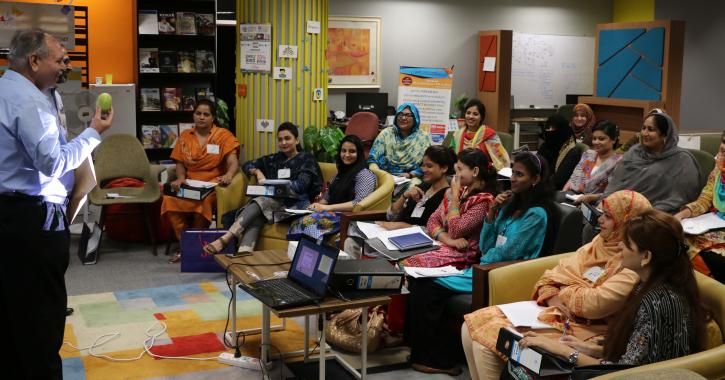
The Center for Entrepreneurship (LCE) at LUMS recently launched the Urban Youth Project aimed to pioneer an innovative approach to provide low-skilled youth with first time access to business skills and capacity building support. This project is funded by Citi Foundation and British Asian Trust is managing the project on behalf of Citi Foundation.
The Urban Youth Project aims to train micro entrepreneurs from low income communities of Pakistan on basic entrepreneurial skills. The first cohort, which comprises of 30 entrepreneurs, possessed an idea and wanted to either launch their business or scale up their current businesses (including 23 female entrepreneurs), is being trained on basic entrepreneurial skills and covers areas such as, Information Technology, Operations Management, Karobari Pas-e Manzar Mein Bunyadi Mali Taswerat, Marketing kai bunyadi Inasir (marketing), Malyati Nizam mein Shamulyat kai zirai (access to finance) and other areas such as developing business plans, conflict resolution and people management skills. Since the attendees belong to underprivileged income groups with low literacy levels, the training curriculum has been designed in Urdu. The trainings are conducted at LCE on weekends and so far 6 sessions have been completed. A second batch of 30 micro-entrepreneurs is planned to be inducted in Round 2.
The aim of the project is to create more jobs for this specific income group and provide them with access to decent employment opportunities. All the courses in this training programme are geared towards enabling micro-entrepreneurs at the base of the pyramid to have a sustainable livelihood through the development of their own enterprise.
This is the first-time ever that such a programme has been launched for this particular income group. The beneficiaries include people running tuition academies, beauty salons, transport services, to name a few. All attendees want to strengthen their businesses, draw up appropriate business plans and add to their current income.
Thirty-one year Shamim Mushtaq, is a rickshaw driver in Lahore. Breaking stereotypes, driving a rickshaw to support her family and despite several threats from men in her neighbourhood and family to give up her job, she continues to battle her way up the ladder as one of the first female rickshaw drivers in Pakistan. Shamim has also taken beautician courses and is available to her female clients on-call. Shamim can only make ends meet through both her jobs as her husband is currently not working. Shamim has never taken any business course and feels the need to strengthen her business aptitude as well as her communication and negotiation skills as she dreams of training 500 rickshaw ranis in the country, while she enjoys the position of the lead rani. In order or her to realise her dream, she requires support in developing business plans, financial plans, communication plans and marketing plans. She hopes to learn these at LUMS through the Urban Youth Project.
Meanwhile, twenty-four year Rabia Ashiq, runs her academy in the outskirts of Lahore on Bedian Road for the past three years. As yet, she has managed to get a facility which comprises of 15-16 rooms but she is unable to manage it due to inadequate resources and managerial skills. Presently, she is earning no profit out of the venture. Rabia fears that if her business model continues to go this way, she will have to close down her academy since she is already in debt. However, she hopes to gain the required skill set to sustain her business through the Urban Youth Project at LUMS and is hopeful she will not have to give up on her lifelong dream of educating children.











